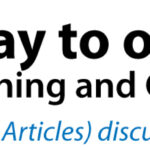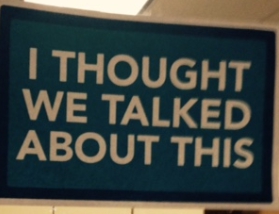
Curiosity
February 18, 2016
To Be Good is Not Enough, When You Dream of Being Great
March 15, 2016HOW DO YOU CHANGE YOUR BEHAVIORS
IN DEALING WITH PEOPLE?
No matter how smart or aware you are when dealing with people, the question remains: If you want to add a more skilled approach to your interactions with others, is being aware enough to change your behaviors?
My workshops on building ALL-IN Culture are devoted to giving participants an expanded set of interpersonal skills and processes that foster collaboration and teamwork. The best example of this is the conversation around the most important behavior in building positive trust and mutual respect in dealing with others: Listening.
Americans have not been taught to listen, and to make matters worse – the Millennial generation has moved their primary communications to hand held devices, with text messaging leading the way. As students of our educational system, we were encouraged to take Toastmaster’s classes, or required to present our thoughts using a Power Point format. Both of these approaches focus on “Telling and Selling”, with a disregard for Listening with the intent to understand what someone has just said.
The American focus on “Telling and Selling” makes “Trusting and Respecting” other people very difficult.
I have a segment in my workshops that asks the question: “How do you know that you respect someone?”
I find people are not very clear on the answer – in most cases, I wait for what seems like a long time before any one tries to answer this question—
What do YOU think the answer is?
The thing you do when you respect someone is you listen to them- The highest level of respect is listening to someone with intent to understand what they just said. When you are in need of advice, you seek the input and advice of someone you respect.
The one rule that transcends all Religious and Spiritual practices is:
“The Golden Rule” – Do Unto Others as You Would Have Them Do Unto You
If you want to be respected, you must first show respect. You need to listen with the intent to understand and not just wait to sell and tell. So, what are the behaviors that demonstrate that you are listening to someone? The answer is very simple:
- You can Paraphrase what someone has said
- You can Ask Clarifying Questions
- You can Take Notes
– and most importantly
- You can Make Sure that you repeat the most important mutual understanding – You Never Want to hear the words “I THOUGHT WE TALKED ABOUT THIS”
All of these behaviors demonstrate that you are listening, and are tangible ways of giving respect to the individual you are talking with. If you are the person who shows respect, you will end up being the person who is respected. These are simple behaviors that will have huge rewards in all of your relationships, but how do you become aware of this skill, how do you change what you have been rewarded for – Selling and Telling – to Paraphrasing and Asking Clarifying Questions?
We are now back to the opening question: Is being aware of the power of listening with the intent to understand, enough to change your behaviors? What is the path way to changing your behaviors, and understanding what you have to do?
The Pathway to Behavior Changes:
The 1st step in changing a behavior is being intellectually committed to the belief that this is the right thing to do. Awareness needs the logic of understanding to help develop your commitment.
Once you have defined the intellectual commitment, the next step is defining a conscious awareness of your commitment to this change. In other words, when you are talking to another individual, you make a commitment to “paraphrase and or ask clarifying questions”. When I first started trying to change my listening approach, I decided to take the challenge to the highest level of skill – Could I influence someone’s opinion by only asking questions? This was one of the hardest things I have ever tried to accomplish, and to this day I still have to stay conscious for this level of behavior.
The most important thing to aware of when trying to change a behavior is knowing it takes between 2-3 months of being conscious to get to the place where the new behavior becomes sub-conscious. This is when you have the skill emotionally supported by not only the intellectual understanding, and you have been rewarded by the fact that this behavior is actually working. You feel that greater sense of respect from those you interact with – More people are telling you more things.
A final thought: never try to change a lot of things at one time. Behavioral change needs to happen in small pieces. During the first segment of my workshops, I lead a discussion of what “being great” is, and challenge the participants to claim one thing that they want to be great at. The workshop usually defines over 15 behaviors that can impact your interpersonal relationships and decision processes. During the last segment of the workshop I have the participants commit to adding just 2 of these behaviors to their interpersonal communications. I challenge participants to only work on 1 or 2 behaviors over the next 2 months, and then build on that durin the following 2 months. You become a more skillful communicator over time – not all at once.
The Main question is: What is the value of being Trusted and Respected by the people you interact with? If your answer is that this is very important, then follow The Golden Rule”:
Do Unto Others as You Would Have Them Do Unto You





